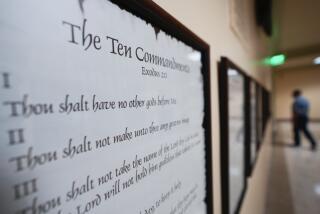Court Stays Ban on Ten Commandments in Park
- Share via
LINCOLN, Neb. — A federal appeals court has tossed out an earlier decision that a Ten Commandments monument must be removed from an eastern Nebraska city park.
The 8th U.S. Circuit Court of Appeals issued an order Tuesday saying the full court will review a February ruling in which a three-judge panel of the court said the monument in Plattsmouth violated the constitutional separation of church and state.
The American Center for Law and Justice, a group that focuses on family and religious issues, had asked for the review.
“This is a very important and encouraging development that clears the way for another opportunity to prove that the display of the Ten Commandments is not only part of our heritage and history, but constitutional as well,” said Francis J. Manion, senior counsel for the group representing the city of Plattsmouth.
Tim Butz, executive director of the Nebraska American Civil Liberties Union, said he was not surprised by the court’s decision to hear the appeal.
“We’re not scared by this. We’re not intimidated by it. We’re ready to go forward,” Butz said.
The ACLU sued on behalf of an atheist Plattsmouth resident who contends the monument is unconstitutional. The 5-foot-tall granite monument lists the Ten Commandments and is emblazoned with two stars of David.
In 2002, U.S. District Judge Richard Kopf of Lincoln rejected the city’s argument that the monument is protected by the 1st Amendment’s guarantee of religious freedom. He ordered the removal of the monument, saying it “conveys a message that Christianity and Judaism are favored religions.”
The three-judge appeals court panel agreed in a 2-1 decision, saying the monument’s “message is undeniably religious.”
The St. Louis-based 8th Circuit, which covers Nebraska, Minnesota, Iowa, Missouri, Arkansas, North Dakota and South Dakota, has not set a date for oral arguments in the case.
More than 4,000 Ten Commandment monuments are displayed in cities nationwide. Many were donated by the Fraternal Order of Eagles in the 1950s as part of a campaign timed to coincide with the release of the movie “The Ten Commandments.”
Courts have issued conflicting rulings on public Ten Commandments displays, and the Supreme Court has refused to hear cases dealing with their constitutionality.
More to Read
Sign up for Essential California
The most important California stories and recommendations in your inbox every morning.
You may occasionally receive promotional content from the Los Angeles Times.








